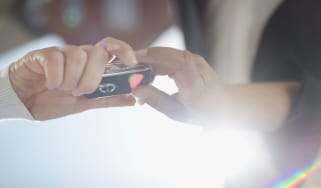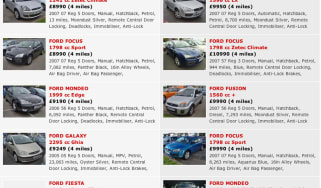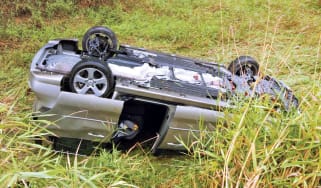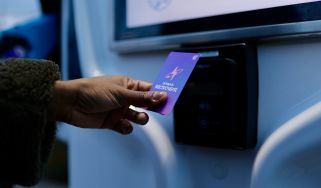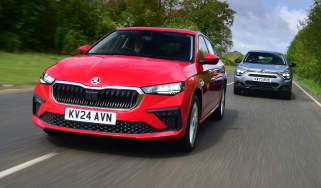How to avoid buying a car with outstanding finance
There’s a risk that the car you’re thinking of buying might have outstanding finance. Here’s what happens if you unknowingly buy one and how to avoid getting caught out.

If you buy a car with finance outstanding on it, you can open up a whole world of expensive trouble. You will not be the legal owner and there’s a very real possibility that the car could be repossessed once the finance company catches up with you. In this guide we explain what happens if you buy a car with outstanding finance and how to avoid making that costly mistake.
Car finance packages like Personal Contract Purchase (PCP) or Hire Purchase (HP) are some of the most popular and affordable ways for drivers to buy a new or used car or van. However, with these finance schemes, it’s the finance provider and not the buyer who legally owns the vehicle until all outstanding finance has been paid off.
Most people wait until the end of their contract or settle the remaining debt before looking to sell their car, but there are some unscrupulous sellers who may choose to advertise and sell a car with outstanding finance still on it.
When buying a used car privately or from a dealership, it’s easy to get caught up in the thrill of searching for your new vehicle. But most buyers recognise the need to make basic checks on the car’s overall condition, MOT history and service records before handing over any hard earned money. One thing that can be overlooked, however, is the need for a HPI or car finance check to see if there is any money owed on the car.
What is the law on cars with outstanding finance?
The law states that a seller must declare if there is any outstanding finance remaining on a vehicle and the lender must be paid in full before the car is sold, but this doesn’t always stop some sellers.
If a car has outstanding finance secured against it, the finance provider will still have an interest until it is paid off in full, which means they could chase you for the owed money or attempt to repossess the car without giving you a refund. This will leave you out of pocket and without a car. You could also be liable for court action. Thankfully, there are steps you can take to avoid being caught out.

What does it mean if a car has outstanding finance?
If a car has outstanding finance, it means there are outstanding finance payments remaining from an active PCP or HP finance agreement. If this is the case, the car finance provider will still legally own the car until all outstanding money has been paid. Only after the finance agreement has been settled and the ownership has been transferred can a car be sold.
If a car has been bought or part-exchanged at a dealership, they should settle the remaining finance before advertising the car for sale. Dealers will usually do their own car finance checks on cars they have in stock so you can ask to see the paperwork if a car is being advertised as HPI checked or similar.
Can you buy a car with outstanding finance?
You should avoid buying any car which has outstanding finance.
If finance payments are owed on a car, the car belongs to the finance company and the seller does not have the right to sell the vehicle. If you then become the ‘owner’ of that car, even if you buy it in good faith and are unaware of the outstanding finance, you will inherit any debt and it will be your responsibility to settle the debt.
What happens if you buy a car with outstanding finance?
While nobody wants to discover they have unknowingly bought a car with outstanding finance, this can happen. So it's important to know what to do in this scenario.
If you buy a car with outstanding finance but had no knowledge that the finance deal existed, ‘good title’ rules mean that you have the right to keep the car. The finance company will still want the outstanding payments settled but it is up to the company to prove that you don’t have ‘good title’ to the vehicle.
If you are contacted by a legitimate finance company suggesting that there is outstanding finance on your car. It makes sense to enter into correspondence on the matter with them but retain copies of everything. You should explain that you bought the car in good faith and include copies of the advertisement and the receipt of sale if you have them. You should also contact the person or business that sold you the car to try and understand if they were aware of the outstanding finance. Again, retain copies of everything.
If this process doesn’t work and the finance company still demands payment, you should contact the Financial Ombudsman and Citizens Advice. Failing that, you may need to see a solicitor.
What if I find out the car has outstanding finance before I buy it?
If you find out a car has outstanding finance, don’t buy it and walk away.
If you know a vehicle has outstanding finance and buy it anyway, you are just as culpable as the seller and ‘good title’ rules won't apply. If the finance company can prove this, it can rightfully recover the vehicle, the money or both.
Unless the seller agrees to pay-off the remaining balance and provides you with absolute proof all finance has been paid off, buying a car with outstanding finance should be avoided at all costs. Should you decide to continue with the purchase, it is recommended that you also check with the finance company before handing over any money.
How to check if a car has outstanding finance
Buying a car with outstanding finance can be both problematic and expensive. Thankfully, these issues can be avoided by either purchasing your car from a reputable dealer who has already done the necessary checks, or by doing them yourself if you are buying privately.
For as little as £5, there are many different companies which can check a car’s history to see if there is any outstanding finance, as part of a detailed report which can also give you a car’s service history, MOT record as well as insurance write-offs and previous sale prices.
Buying a car should be a fun and painless experience, doing some due diligence and making the necessary checks before parting with cash will help you avoid any costly headaches in the long run.
Have you ever unknowingly bought a car with outstanding finance? Let us know in the comments...



